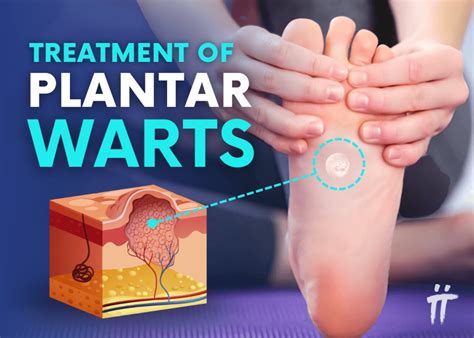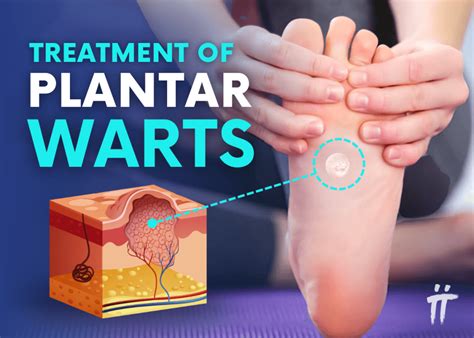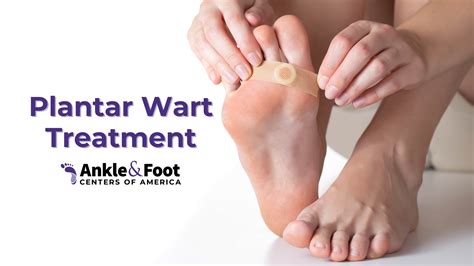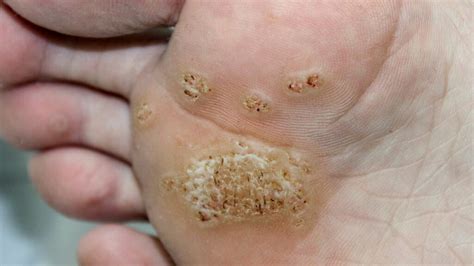Intro
Discover effective treatments for Plantar Wart removal, including cryotherapy, salicylic acid, and duct tape methods, to alleviate foot pain and promote healing.
Plantar warts are a common and often frustrating condition that can cause discomfort and pain on the soles of the feet. They are caused by the human papillomavirus (HPV) and can be spread through skin-to-skin contact or by walking barefoot in areas where the virus is present. If you're struggling with plantar warts, it's essential to understand the importance of effective treatment to prevent the spread of the virus and alleviate symptoms. In this article, we'll delve into the world of plantar warts, exploring their causes, symptoms, and most importantly, effective treatment options.
Plantar warts can be particularly problematic due to their location on the soles of the feet, which bear the body's weight and are subject to constant pressure and friction. This can lead to significant discomfort and pain, making everyday activities like walking or standing challenging. Moreover, if left untreated, plantar warts can spread to other parts of the body or to other individuals, making prompt and effective treatment crucial. The good news is that with the right approach, it's possible to manage and eliminate plantar warts, restoring comfort and confidence to those affected.
Understanding the causes and symptoms of plantar warts is the first step towards seeking effective treatment. The primary cause, as mentioned, is the HPV virus, which can enter the body through small cuts or abrasions on the skin. Symptoms typically include a small, rough growth on the sole of the foot, which may be flat or raised, and can sometimes be accompanied by small black dots, which are actually small blood vessels. The area around the wart may also become thickened and hardened, leading to additional discomfort. Recognizing these symptoms is key to initiating the right treatment plan.
Understanding Plantar Warts

To effectively treat plantar warts, it's essential to understand their nature and how they develop. Plantar warts are more common in children and young adults, but they can affect anyone. The virus that causes plantar warts can be highly contagious, spreading through direct contact with an infected person or by touching contaminated surfaces. In some cases, the virus can also be spread through shared personal care items like towels or razors. Understanding the contagious nature of plantar warts emphasizes the importance of prompt and effective treatment, not only for the individual's comfort but also to prevent the spread of the virus.
Causes and Symptoms
The causes of plantar warts are well-documented, with the HPV virus being the primary culprit. However, certain factors can increase the risk of developing plantar warts, including having a weakened immune system, walking barefoot in public areas, and sharing personal care items. Symptoms can vary from person to person but typically include pain or discomfort when walking or standing, a small, rough growth on the sole of the foot, and sometimes, small black dots within the wart. Recognizing these symptoms is crucial for seeking the right treatment.Treatment Options for Plantar Warts

Fortunately, there are several effective treatment options for plantar warts, ranging from home remedies to professional medical interventions. For mild cases, home treatments such as applying salicylic acid or duct tape to the affected area can be effective. However, for more persistent warts, medical treatments like cryotherapy, where the wart is frozen off, or cantharidin, a blistering agent, may be necessary. In severe cases, surgical removal of the wart or the use of laser therapy may be recommended. It's essential to consult with a healthcare professional to determine the best course of treatment based on the severity of the condition and individual health factors.
Home Remedies
For those preferring to start with less invasive methods, several home remedies can offer relief and potentially clear up plantar warts. These include: - Applying salicylic acid directly to the wart, which helps dissolve the keratin protein that makes up the wart, leading to its gradual disappearance. - Using duct tape to cover the wart for extended periods, which can help irritate the wart and stimulate the immune system to fight off the virus. - Soaking the foot in warm water and then using a pumice stone to gently remove dead skin cells, which can help reduce the size of the wart over time. It's crucial to note that while home remedies can be effective, they may not work for everyone, and patience is key as these methods can take time to show results.Prevention of Plantar Warts

Preventing plantar warts is always better than treating them. Several steps can be taken to reduce the risk of developing plantar warts, including:
- Avoiding walking barefoot in public areas like swimming pools, locker rooms, and public showers.
- Keeping the feet clean and dry, changing socks regularly, especially after exercising or sweating heavily.
- Avoiding sharing personal care items like towels, socks, or razors.
- Ensuring that any cuts or abrasions on the feet are properly cleaned and covered. By following these preventive measures, individuals can significantly reduce their risk of contracting plantar warts.
Importance of Professional Medical Advice
While home remedies and preventive measures are valuable, it's essential to seek professional medical advice for accurate diagnosis and treatment, especially if the wart is large, painful, or persistent. A healthcare provider can offer personalized advice and treatment based on the individual's health status and the severity of the condition. Moreover, if the wart does not respond to home treatments or if there are concerns about the appearance or symptoms of the wart, medical intervention may be necessary to prevent complications and ensure effective removal.Living with Plantar Warts

Living with plantar warts can be challenging, but there are ways to manage the condition and reduce discomfort. Using orthotics or shoe inserts can help redistribute pressure and alleviate pain. Keeping the foot clean and dry, and avoiding irritants can also help manage symptoms. Moreover, maintaining a healthy lifestyle, including a balanced diet and regular exercise, can help boost the immune system, which can aid in fighting off the virus.
Coping Mechanisms
Coping with the discomfort and potential embarrassment of plantar warts requires patience, understanding, and the right coping mechanisms. This includes: - Practicing good foot hygiene to prevent the spread of the virus. - Using pain relief measures such as pads or cushions to reduce discomfort. - Avoiding activities that exacerbate the condition, such as running or jumping. - Seeking support from family, friends, or support groups to deal with any emotional impact.Conclusion and Next Steps

In conclusion, plantar warts are a common condition that can cause significant discomfort and pain. However, with the right understanding, treatment, and preventive measures, it's possible to manage and eliminate plantar warts. Whether through home remedies, medical interventions, or a combination of both, there are effective ways to treat plantar warts. It's essential to consult with a healthcare provider for personalized advice and to ensure the best possible outcome. By taking proactive steps towards treatment and prevention, individuals can regain comfort and confidence in their daily lives.
We invite you to share your experiences or ask questions about plantar warts in the comments below. Your insights can help others understand and cope with this condition. Additionally, if you found this article informative, please consider sharing it with others who might benefit from this information. Together, we can promote awareness and understanding of plantar warts, leading to better management and treatment outcomes.
What causes plantar warts?
+Plantar warts are caused by the human papillomavirus (HPV), which can enter the body through small cuts or abrasions on the skin.
How are plantar warts treated?
+Treatment options for plantar warts include home remedies like salicylic acid, medical treatments such as cryotherapy, and in severe cases, surgical removal or laser therapy.
Can plantar warts be prevented?
+Yes, plantar warts can be prevented by avoiding walking barefoot in public areas, keeping the feet clean and dry, avoiding shared personal care items, and ensuring any cuts or abrasions on the feet are properly cleaned and covered.
How long does it take to treat plantar warts?
+The duration of treatment for plantar warts can vary significantly depending on the severity of the condition, the treatment method chosen, and individual health factors. It's essential to consult with a healthcare provider for a personalized treatment plan and timeline.
Are plantar warts contagious?
+Yes, plantar warts are contagious and can be spread through direct contact with an infected person or by touching contaminated surfaces.
